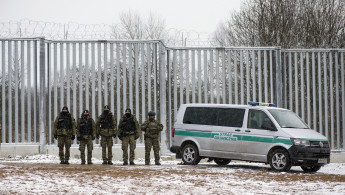Iraqi migrants launch hunger strike in Polish detention: reports
Four Iraqi migrants held at a Polish detention facility began a hunger strike on Tuesday to protest the conditions of their detention, according to local reports.
The Iraqis have been held at the Guarded Centre for Foreigners in Lesznowola, east-central Poland for 17 months, Polish news site wyborcza.pl reported Tuesday.
The website published a purported copy of a letter written by the migrants in English and sent to the commander responsible for the centre.
"What have we done to be kept behind walls for that long, severe, stern period?" they asked in the letter.
"We are willing to stop eating for a no-limit period… till we feel we are human beings, the same as others."
The New Arab could not verify the authenticity of the letter.
The launch of the protest comes as another Iraqi migrant was moved into solitary confinement as he entered day 20 of a hunger strike at another Polish detention centre, a migrant rights monitor said on Wednesday.
Muhammad al-Zirjawi, 26, has been held at a detention centre for migrants in Przemyśl, south-eastern Poland for 17 months, according to Grupa Granica.
He began his hunger strike on 15 December.
Pro-refugee activist Mariola Pietak told wyborcza.pl that she had spoken to Zirjawi, who said he had suffered mental distress including panic attacks and suicidal thoughts while detained.
Like thousands of other migrants and refugees, Zirjawi crossed into Poland via Belarus in late 2021.
The European Union accused Belarus at the time of luring in migrants and pushing them to illegally cross the Polish border to manufacture a crisis and destabilise the EU, as revenge for sanctions against Belarusian President Alexander Lukashenko's regime.
Belarus denied the accusations.
Though the crisis has somewhat abated, some migrants have been held at detention centres on either side of the border ever since.
Migrants at the Belarus-Poland frontier have been subject to "brutal violence" from guards, according to human rights groups.





 Follow the Middle East's top stories in English at The New Arab on Google News
Follow the Middle East's top stories in English at The New Arab on Google News
![The UAE is widely suspected of arming the RSF militia [Getty]](/sites/default/files/styles/image_330x185/public/2024-11/GettyImages-472529908.jpg?h=69f2b9d0&itok=Yauw3YTG)
![Netanyahu furiously denounced the ICC [Getty]](/sites/default/files/styles/image_330x185/public/2024-11/GettyImages-2169352575.jpg?h=199d8c1f&itok=-vRiruf5)
![Both Hamas and the Palestinian Authority welcomed the ICC arrest warrants [Getty]](/sites/default/files/styles/image_330x185/public/2024-11/GettyImages-2178351173.jpg?h=199d8c1f&itok=TV858iVg)